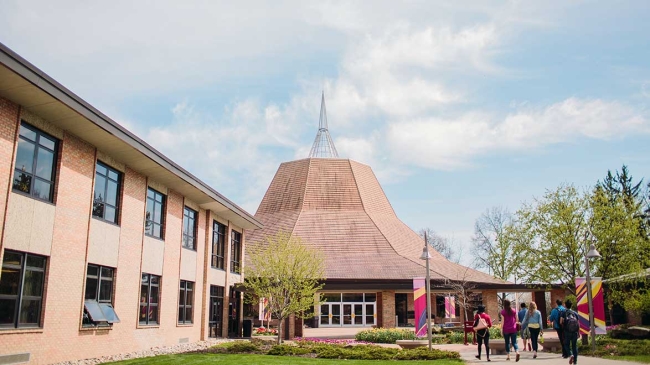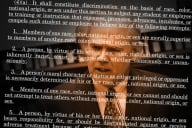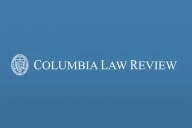You have /5 articles left.
Sign up for a free account or log in.

While Calvin University recognizes that same-sex attraction isn’t a choice, it still considers acting on those urges to be sinful.
Calvin University
By all accounts, Joseph Kuilema, a social work professor at Calvin University, is an exceptional employee. Fellow faculty and supervisors alike note his passionate beliefs and his commitment to both students and the college’s mission. But despite his stellar work record, he’ll likely soon be out of a job.
The reason? Kuilema officiated a same-sex marriage last year for another employee of the evangelical university. And it isn’t his first clash with Calvin on LGBTQ+ rights.
Kuilema was denied tenure in 2018 because of his advocacy for LGBTQ+ rights. Instead, he was shuffled into a cycle of renewable two-year appointments.
Last fall, Kuilema officiated the wedding of Nicole Sweda, then a research associate at Calvin’s Center for Social Research. Sweda violated Calvin’s policy barring same-sex marriages for employees, but rather than fire her, the university spun off the research center as an independent entity. Sweda quit anyway. Now Kuilema may be out of a job as well: Calvin’s Professional Status Committee has recommended denying his reappointment for a third term.
Memos detailing the decision to deny Kuilema reappointment note his commitment to students, his outstanding work record and the support of his colleagues, but they ultimately cite his role in officiating a same-sex marriage, in direct violation of university policies established by the Christian Reformed Church, which defines marriage as between a man and a woman.
While Kuilema plans to appeal, he knows his days at Calvin may be limited.
“I love teaching at Calvin. I love my colleagues. I love our students. As somebody who went to the institution [as an undergraduate], and as somebody who identifies as a Christian, I really enjoy the ability to integrate my faith and my professional practice,” Kuilema said. “Calvin’s afforded me the opportunity to do that work in ways that are not possible everywhere else.”
The Fallout
When Sweda tied the knot with her girlfriend, Annica, on Oct. 15, 2021, it was the culmination of an eight-year relationship that began when both were juniors in high school.
Their marriage was also an act expressly forbidden by Sweda’s employer, Calvin University, prompting meetings with college officials who told her she was in violation of staff policy. That led to Calvin turning its research arm into a separate entity, allowing Sweda to stay on staff. But ultimately Sweda resigned so she could speak freely on LGBTQ+ issues.
And Sweda didn’t just lose her job; she also lost her faith along the way.
“I would not call myself a Christian anymore,” Sweda said. “I would say that I’m spiritual, but I’m not very religious—mainly because it’s kind of been beaten out of me by many different Christians. At this point, I don’t personally feel that this is a positive thing for me anymore.”
Sweda recalls debating her own existence and rights in class as a student at Calvin. But now it’s a debate she refuses to have, noting that U.S. law allows her to marry her female partner. She stands by her work record and sees Calvin as wrong for denying her civil rights as affirmed by the Supreme Court when it legalized same-sex marriage nationwide in the case of Obergefell v. Hodges in 2015.
“Honestly, there’s nothing in my file at Calvin that is negative,” Sweda said. “I did a lot of good for a lot of people there, and for the students that I supervised, and it really does come down to the fact that I’m openly queer why this has all happened, and I think that’s disgusting.”
Sweda is a former student of Kuilema’s, and he said he considers her a friend. He knew the risks of officiating her wedding but said he decided, after praying on it—and consulting with his pastors, his program director and department chair—to do so anyway. As an advocate for LGBTQ+ rights, he saw the opportunity to practice what he preached. Kuilema understood the high stakes of officiating a wedding ceremony while working for a college affiliated with a church that believes it’s OK to be gay but sinful to physically act upon those desires.
Kuilema is no stranger to the belief system that governs Calvin University: in addition to attending the institution, he grew up as a member of the Christian Reformed Church. But he also believes the prohibition on same-sex marriage is based on a misreading of the scriptures. It’s a doubt that crept in when he was young and that has only grown over the years.
“I began to have some real questions, and for me as a Christian, the way through those questions has always been deeper engagement and deeper study,” Kuilema said. “Over time, I’ve come to understand what I think the Bible is really prohibiting is abusive, coercive forms of sex, including ritual cultic sex, basically sex trafficking or religious sex in temples, and not [prohibiting] a loving, committed, covenantal relationship between two consenting adults.”
Same-sex attraction is an unsettled issue in some Christian communities. While countless churches in the U.S. hold that the Bible prohibits same-sex activity, many congregations interpret the scriptures differently and, like Kuilema, welcome and uplift members of the LGBTQ+ community. But the Christian Reformed Church is in the first camp, which places affiliated Calvin University there as well.
Calvin officials won’t answer questions on whether Kuilema broke any stated policy. The university also declined an interview request from Inside Higher Ed. Answering questions by email, Calvin spokesperson Matthew Kucinski declined to comment on personnel matters. In response to questions about doctrinal disagreements, he highlighted the church’s stance.
“The university’s position on human sexuality is grounded in the teachings of Scripture, the confessions, and, because of its covenantal ecclesiastical partnership with the Christian Reformed Church (CRC), the stated positions and pastoral guidance of the denomination. The CRC and the university hold that human sexuality is a gift from God and that sexual relations are reserved exclusively for expression in the context of marriage between a man and a woman,” he wrote. “In addition, the CRC also teaches that sexual orientation is not a sin and that lesbian, gay, bisexual, and transgender people—like all people—are created in God’s image and, as valued members of the human family, should be treated with respect, grace, understanding, and love.”
Kucinski added that Calvin employees are required to be Christian and that faculty members must sign an agreement to “teach, speak, and write in harmony with the Reformed confessions.” While faculty members can disagree with certain positions, they are expected to abide by them.
Beyond his own pending termination, Kuilema also worries about LGBTQ students at Calvin—a sentiment Sweda echoes as well. Both are concerned that such students come to Calvin—or other religious institutions—with an incomplete picture of how they’ll actually be treated.
“There has been, for a long time, a lack of transparency about these policies, at religious higher education institutions, for incoming LGBTQ students,” Kuilema said. “LGBTQ students deserve more clarity and transparency from religious institutions, about whether or not they are fully welcomed, or welcomed in terms of their orientation but not in terms of having relationships. I think that LGBTQ youth are making these decisions about four years of their life, hundreds of thousands of dollars, potentially, with imperfect information about how they will be accepted or not at these institutions. If religious institutions are going to continue to say, ‘Hey, come here and attend, but you’d never be able to work here if you get married,’ students deserve to know up front.”
Asked about these concerns, Kucinski pointed to Calvin’s Student Conduct Code, which explains students are accountable to church standards regardless of sexual orientation or gender. He added, “Calvin University expects students to follow biblical guidelines for intimacy and for sexual relationships. The student conduct code prohibits sex outside of marriage, casual sexual encounters, cohabitation, involvement with pornography, and internet cybersex.”
While Kucinski said that the university aims to welcome members of the LGBTQ+ community and treat them “with respect, justice, grace, and understanding,” he acknowledged “that for those who desire for Calvin to be fully affirming when it comes to homosexual behavior, it is understandable that Calvin may not feel as welcoming as they would like.”
In the broader university community, fellow faculty members have rallied to support Kuilema, with dozens signing a letter urging the Board of Trustees to overturn the decision to deny his reappointment.
Trustees have responded, without directly addressing the letter, by sending an email to students, faculty and staff addressing LGBTQ+ issues in name, if not in substance. That email, obtained by Inside Higher Ed, notes that Calvin has “a responsibility to abide with the positions of the church.” While the letter notes that church teachings state that sexual orientation is not a matter of choice, acting on same-sex attraction is. The letter says that “sexual acts are a choice, and … those that fall outside of a covenantal union between one man and one woman do not reflect God’s intentions or desires for God’s people.”
LGBTQ+ Rights and the Church
Sara Moslener, a lecturer in the Department of Philosophy and Religion at Central Michigan University, said the battle over LGBTQ+ rights in the church has been fought for years and represents a divide between mainline Christians and their evangelical counterparts.
But she sees Christianity, broadly, as becoming more accepting of LGBTQ+ rights.
“There are more and more churches where LGBTQ Christians can be welcomed and have their families and spouses welcomed, and those churches are becoming more prominent,” Moslener said. “And that has been the case in the last 20 years. But also people within evangelical schools and churches are speaking up and trying to challenge from within, or they are leaving.”
One obstacle in affirming LGBTQ+ relationships, she said, is whether a church or college even has the autonomy to do so, depending on its denominational membership.
The overall shift Moslener has seen on LGBTQ+ rights at U.S. Christian institutions extends to Calvin, where she earned her undergraduate degree in 1996. In her time there, she said, she didn’t know anyone who was out, but now being gay is less of a secret on campus.
“The evolution has happened among the faculty, among the students,” Moslener said.
Brie Loskota, executive director of the Martin Marty Center for the Public Understanding of Religion at the University of Chicago, notes that support of LGBTQ+ rights among individual Christians in the U.S. is fairly strong, particularly among the younger set. But institutions are harder to move.
“At issue is not only how a congregation engages with its scripture, but also what it claims their tradition teaches and requires, how they think about ongoing spiritual direction and movement,” Loskota said by email. “There are specific verses used as tools to undergird each congregation’s approach to how it deals with LGBT people. Churches will claim ‘Biblical literacy’ in their favor, and others would contest that those claiming to view the Bible as literal will engage in their own form of interpretation and selection. In many ways these issues are at the heart of how religions work. How they respond to, shape and are shaped by their text, their traditions, their interpretative frameworks, their cultural contexts, the people within them.”
Some churches, she notes, see “LGBT inclusion as a problem of secular culture to be fortified and actively advocate against.” Others adopt a “don’t ask, don’t tell” policy, and some “have used this moment to try to repair the harms caused by a lack of LGBT inclusion to welcome these members and their families back into the fold.” Still others have always been welcoming.
Kuilema is worried about the way LGBTQ+ students and employees are treated, wondering if discrimination against them might run afoul of civil rights law now that gay marriage is legal in all 50 states.
He points to cases like Loving v. Virginia, which legalized interracial marriage in 1967. Yet Bob Jones University enforced a racist policy banning interracial dating for years, which led to the Supreme Court upholding a decision in 1983 to revoke its tax-exempt status. (It took until 2000 for Bob Jones to drop its ban on interracial relationships, following a public uproar.)
Like Loving v. Virginia, Obergefell v. Hodges allowed people to marry whomever they want. With that ruling, Kuilema wonders how long colleges can deny certain civil rights.
“We have created a civil right,” Kuilema said. “And now the question becomes whether religious higher education institutions can continue to discriminate against people, claiming religious freedom, when those folks are just trying to access the basic civil rights.”








